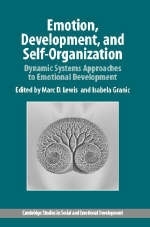
Emotion, Development, and Self-Organization
Cambridge University Press (Verlag)
978-0-521-52527-5 (ISBN)
In the last twenty to thirty years, a new way to understand complex systems has emerged in the natural sciences - an approach often called non-linear dynamics, dynamical systems theory, or chaos theory. This perspective has allowed scientists to trace the emergence of order from disorder and complex, higher-order forms from interactions among lower-order constituents. This is called self-organization, and is thought to be responsible for change and continuity in physical, biological, and social systems. Recently, principles of self-organizing dynamic systems have been imported into psychology, especially developmental psychology, where they have helped us reconceptualize basic processes in motor and cognitive development. Emotion, Development, and Self-Organization is the first book to apply these principles to emotional development. The contributors address fundamental issues such as the biological bases of emotion and development, relations between cognition and emotion in real time and development, personality and individual differences, interpersonal processes, and clinical implications.
Introduction: a new approach to study of emotional development Marc D. Lewis and Isabela Granic; Part I: Intrapersonal Processes: 2. Self organization of discrete emotions, emotion patterns, and emotion-cognition relations Carroll Izard; 2. Emotional self-organization at three time scales Marc D. Lewis; 3. Emotions as episodes of subsystem synchronization driven by nonlinear appraisal processes Klaus R. Scherer; 5. Surprise! Facial expressions can be coordinative motor structures Linda Camras; 6. The dynamic construction of emotion: varieties in anger M. F. Mascolo; Part II: Neurobiological Perspectives: 7. The self-organization of the right brain and the neurobiology of emotional development Alan N. Schore; 8. Motivation of neural plasticity: neural mechanisms in the self-organization of depression Kate Harkness and Don M. Tucker; 9. Emotion is essential to all intentional behaviors Walter J. Freeman; 10. The neurodynamics of emotions: an evolutionary-neurodevelopmental view Jaak Panksepp; Part III. Interpersonal Processes: 11. Beyond bidirectional models of parent-child relations: a self-organization perspective Isabela Granic; 12. Attachment and self-organization Deborah Laible and Ross Thompson; 13. The dynamics of emotion-related behaviors in infancy C. de Weerth and Paul van Geert; 14. Theoretical and mathematical modeling of marriage K. D. Ryan and J. M. Gottman; 15. The dynamics of emotion: metaphors, methods, and models of development Daniel P. Keating and Fiona K. Miller.
| Erscheint lt. Verlag | 28.10.2002 |
|---|---|
| Reihe/Serie | Cambridge Studies in Social and Emotional Development |
| Zusatzinfo | Worked examples or Exercises |
| Verlagsort | Cambridge |
| Sprache | englisch |
| Maße | 161 x 236 mm |
| Gewicht | 720 g |
| Themenwelt | Geisteswissenschaften ► Psychologie ► Biopsychologie / Neurowissenschaften |
| Sozialwissenschaften ► Soziologie | |
| ISBN-10 | 0-521-52527-6 / 0521525276 |
| ISBN-13 | 978-0-521-52527-5 / 9780521525275 |
| Zustand | Neuware |
| Informationen gemäß Produktsicherheitsverordnung (GPSR) | |
| Haben Sie eine Frage zum Produkt? |
aus dem Bereich


